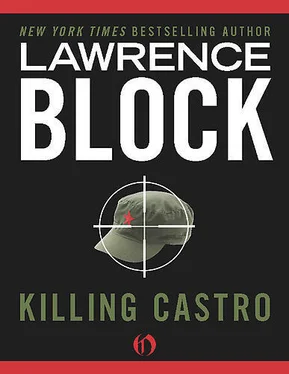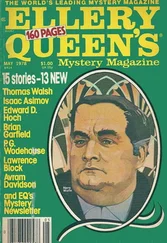“Okay. I love you, ’arper.”
“Then why the hell are you crying?”
“Because I am ’appy.”
He sat next to her, kissed the tears from her eyes.
He held her, patted her. Her eyes adored him.
“You better get going,” he said.
“Don’ you wan’ me to stay tonight?”
“Not tonight,” he said.
She pouted.
“We’ll have plenty of nights,” he told her. “We’ll go to America. We’ll have the rest of our lives, Estrella. I have to be alone tonight, and tomorrow. I’ll meet you at the airport.”
She was a woman who knew better than to argue. She kissed him, got dressed, kissed him again, took the tickets and left. By the time she was out the door he wanted to go after her, to tell her he had changed his mind and that he wanted her to stay. He took another quick jolt of rum instead and walked once more to the window. The shade was drawn. He raised it and squinted out through the darkness.
Less than twenty hours. He would have to shoot Castro by six. Then the gun would go back into the mattress, and then he’d hurry downstairs and take a taxi to the airport. Estrella would be there. The plane would take them to Miami, where they would pick up the money from Hiraldo. It would be twenty-five grand at least, since Garth’s share would get re-distributed. Maybe more—maybe thirty-three, if Garth’s partner caught a bullet of his own.
That meant no more jobs, no more of the gun-for-hire routine. With that much capital, plus the several grand he had in banks around the country, he could open some kind of business, could buy himself a soft touch that would let him retire from the trigger-pulling racket.
He tried to go to sleep but it didn’t work out. He wasn’t relaxed enough to sleep; the job loomed in front of him, worrying him, and his eyes stayed open. He gave up, switched the light on and got a cigarette going.
He wished the job was over and done with. It scared him, this one, and it was the first job to have such an effect upon him. He’d pulled plenty of tougher ones, had filled contracts for the syndicate that made this particular hit child’s play in comparison. But this was the one that had him on edge.
He knew why.
On the other jobs, before Estrella, he had been on his own, rootless, empty. Now he had something to lose.
Saturday night Earl Fenton stormed the garrison at San Luis.
He did this alone, because he was alone now. He had been living for two days in the hills; living alone, traveling alone, sleeping alone. He had been living with cancer inside him, living with the sure foreknowledge of death and with the memory of the death of others. The memory of carnage, of Maria shooting Garth in the head, of Manuel screaming before they castrated him, of Jiminez blown to pieces by a grenade, of Maria growing weaker and weaker until she died in his arms.
He moved in silence through the hills. His Sten gun stayed always in his hands, and over his shoulder he carried a musette bag with extra clips for the gun and what food he had been able to salvage from the camp. The pain of the cancer was bad now. The disease was spreading like wildfire through his whole body, and there were times when he would cough uncontrollably while arrows of pain shot through his flesh.
Saturday, around midnight, he made his attack. San Luis was a small town a few miles to the north of Santiago. There was a detachment of soldiers stationed there. Fenton attacked them.
He killed the sentry with a knife. He crept up behind the man on silent feet, plunging the knife he had taken from a corpse into the throat of the sentry who was to become a corpse in his turn. The man died in silence and Fenton stole into one of the barracks.
He sprayed the interior with the Sten gun. He killed fourteen men before a single one of them was entirely awake. Most of them died in their sleep. The rest opened their eyes momentarily and closed them forever.
The gunfire brought soldiers from the other barracks. Fenton put a fresh clip in his Sten gun and readied himself for the charge. He threw himself under a bunk bed, sent out a burst of fire to greet the soldiers who charged into the area. Another group tried to enter through a window and he shot them dead.
They used tear gas. He ran after the first shell and threw it out at them, but the second one went off and filled the small wooden building with thick, eye-burning smoke. He knew better than to try to hold out against it. He broke open the Sten gun and fitted it with a full clip, his last. He left the musette bag behind and raced outside, his finger on the Sten gun’s trigger.
He did not stop shooting. He was surrounded and bullets came at him from all angles, but Fenton stubbornly refused to go down. He fired a full clip at the soldiers before he slumped and died.
The soldiers searched the barracks. They couldn’t believe that this one little man had been the only invader, but there was no one else around, no one but their own dead soldiers.
Someone took the trouble to count the bullets in Fenton. There were sixty-three of them. Machine gun slugs had almost torn him in half.
And, strangest of all, what was left of his face seemed to be smiling.
Hines awoke early Sunday morning. The room was dark because sunlight never reached the basement. He switched on a light and glanced at his watch. It was not yet seven. He tried catching another hour’s sleep but found it impossible. He got out of bed, washed, dressed.
At eight o’clock Señora Luchar brought him breakfast—oatmeal, fresh fruits, biscuits and coffee. She left him and he tried to eat. The food stuck in his throat. He could not possibly have been less hungry.
When she came down for the tray she saw that he had eaten nothing. “There is something wrong with the food?” she said. “You cannot eat it?”
“The food’s fine. I’m not hungry.”
“You are nervous?”
He said nothing because he did not know how to answer her. He was not nervous, not exactly. He wasn’t sure how to describe the feelings he had. He looked at his watch. The time was crawling.
“You should eat. Today will be an important day. Murder is hard work and work is difficult on an empty stomach.”
Hard work? All he had to do was toss a bomb in the air. But her words somehow intimidated him. He picked up his fork and ate some of his food. Then he drank the coffee.
“An important day,” she went on. “And you are doing something for Cuba as well as for your brother, Hines. That, too, is important.”
She left him, sparing him the need to answer her. Between then and noon he went four times to the work bench, and four times he picked up the bomb and hefted it in his hand. It was cylindrical, roughly the size and shape of a can of beer, although of course much heavier. Each time he replaced the bomb on the bench and went back to his bunk.
He no longer thought of giving it all up, of running to the Swiss consulate and asking for asylum. He was committed now, and he did not even think of backing down. At noon he left the house. It was not time yet—Castro’s speech was scheduled to start at five, the hour of bull fights. Hines remembered the García Lorca poem, the one in which every other line was a las cinco de la tarde , at five in the afternoon. A chilling, sobering poem about a bullfighter gored to death in the ring—
But he couldn’t stay around the house. He waved a hand at the Luchar woman, nodded at the old man rocking stonily on the porch. He headed for the Plaza of the Revolution where Castro would speak. Already people were gathering. He would have to arrive early to get a good position.
But how early? He found a Cuban man who spoke English, told him he wanted to see Castro speak, asked him how soon he would have to be there to get a good spot in the crowd.
Читать дальше












